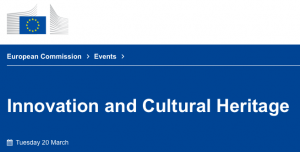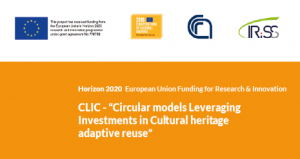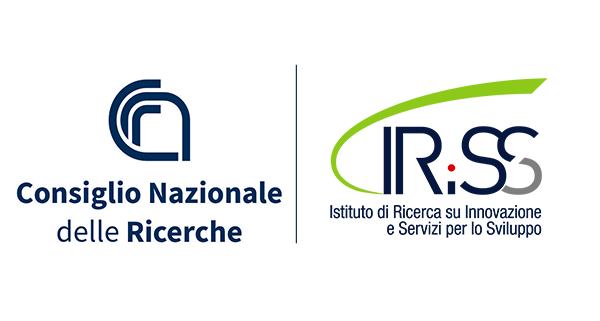Institute for Research on Innovation and Services for Development
Resilience - Innovation - Sustainable Development | Transparency – Organization – Meritocracy
ASSEGNO IRISS N° 1/2018
PUBBLICA SELEZIONE PER IL CONFERIMENTO DI N° 1 ASSEGNO PROFESSIONALIZZANTE PER LO SVOLGIMENTO DI ATTIVITÀ DI RICERCA NELL’AMBITO DEL PROGRAMMA DI RICERCA OPERA LIRICA E REALTÀ AUMENTATA – opeRA.
Scadenza: 19/02/2018
February 1st, 2018
Clic, economia circolare per i beni culturali
January 29th, 2018
Ricerca: economia circolare per beni culturali in un ‘Clic’
January 29th, 2018
Ricerca: economia circolare per beni culturali in un ‘Clic’
January 29th, 2018
Al via a Napoli il progetto Iriss «Clic» per gli investimenti nel riuso del patrimonio culturale
January 29th, 2018
Innovation and Cultural heritage conference – 20 march 2018
 The Innovation and Cultural heritage conference website has been recently launched. The online registration is also open: https://ec.europa.eu/info/events/innovation-and-cultural-heritage-2018-mar-20_en.
The Innovation and Cultural heritage conference website has been recently launched. The online registration is also open: https://ec.europa.eu/info/events/innovation-and-cultural-heritage-2018-mar-20_en.
This high-level conference will be held in Brussels, Royal Museum of Arts and History, on Tuesday 20 March 2018.
January 28th, 2018
Presentation of the project “CLIC – Circular models Leveraging Investments in Cultural heritage adaptive reuse” funded by European program “Horizon 2020”

Monday, January 29, 2018 at 09.00 a.m., at the headquarters of IRISS-CNR in Naples, the project CLIC – Circular models Leveraging Investments in Cultural heritage adaptivereuse, funded by the European program Horizon 2020 within the Call Innovative financing, business and governance models for adaptive reuse of cultural heritage (SC5-22-2017), will be publically presented.
The project is coordinated by IRISS-CNR. The 15 project partners and representatives of the European Commission are expected to participate.
Kick-off Meeting of the project will follow.
The CLIC project is part of scientific research activities on innovative financing, business and governance models able to promote and facilitate the reuse of cultural heritage in European cities and cultural landscapes, from the point of view of circular economy as a model of sustainable development.
The project aims to attract new funds that are sustainable from an economic-financial point of view, for the functional reuse of abandoned buildings and landscapes. Furthermore, these investments will be able to generate positive social and environmental impacts, increase employment and promote cultural growth in thepartners’territories through mixed public-private-social partnership models and specific models of governance, financing and business for the functional reuse of cultural heritage.
The research project has a duration of 3 years and involves 15 Partners from ten European countries, including research institutions, local organizations, businesses and governments.
As a pilot test, the cities of Salerno in Italy and Rijeka in Croatia, the VästraGötaland region in Sweden, and the Pakhuis de Zwijger Cultural Foundation in Amsterdam in the Netherlands are involved.
The partners’ goal is to extend the experimentation of the developed circular economy models also to other territories.
For this reason, some potential stakeholders have already been involved in the initial phase, including representatives of national and local administrations, representatives of the business world, and experts in the field of conservation and enhancement of cultural heritage, who will take part in the presentation of the project.
CLIC research is institutionally supported by international organizations such as the United Nations (UN-Habitat) and ICOMOS, the Ministry of Cultural Heritage and Activities and Tourism (MiBACT), and by local and international companies and organizations, including associations, companies and social cooperatives.
The research will be developed in synergy and as a concrete contribution to the European Year of Cultural Heritage 2018, promoted by the European Parliament and Council.
Scientific Director: Prof. Luigi Fusco Girard (IRISS-CNR).
For further information: clic@iriss.cnr.it
January 28th, 2018
Ricerca, al via il progetto per attrarre investimenti nel “riuso” del patrimonio culturale
January 27th, 2018
Ricerca, al via il progetto per il “riuso” del patrimonio culturale
January 27th, 2018
Journal Of Hospitality And Tourism Insights Call for papers for a special issue on bridging the gap between strategy and service fields: towards a mutual understanding
There is a recently emerging stream of research that spans the boundary between strategy fields, including strategic management, strategic marketing, strategic HRM, and service fields, including but not limited to hospitality and tourism management. For instance, in the last few years, a number of articles on tourism and hospitality management have employed concepts from the strategy area when building their theoretical arguments. Likewise, in mainstream strategy journals, some articles have made use of insights from the service industries. This mutual interest arises not only because of the conceptual links between the strategy and service fields, but also because the two fields have complementary benefits.
Click here for more information
January 22nd, 2018


You must be logged in to post a comment.